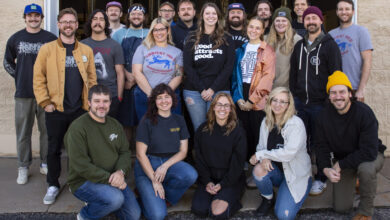Just as a reminder, my articles have always been directed toward new business owners. Well-established businesses will already have their own procedure, and it isn’t my place to advise anyone on what they do. My other caveat is that I base these articles on practices I have found to be most useful for my business and realize these might not suit everyone. I do assume readers are working from a brick-and-mortar store and not running a home-based business.
I hope you have all enjoyed a successful holiday season. More importantly, I hope you have all enjoyed some well-deserved time with your family and friends and are looking forward to a happy, healthy, and prosperous 2025.
On preparing for a new year, there are a number of business factors to consider. My first suggestion, before anything else, is to consider your next moves while you enjoy some well-deserved time off. You can decompress after what can often be a very stressful period as you try to stay on top of orders and inventory.
Organize
As I said, my practices may not be for everyone. I work best in a state of “organized chaos” — in some people’s minds, that means a complete mess. When I get back to the shop after the holidays, my first job is to tidy the place up to my wife’s satisfaction — she’s the real boss, after all! It may also be useful to reconsider the layout of your shop. Would any rearrangement make your operation more practical or efficient? For the coming year, my wife and I have decided to do away with rented storage and bring all our inventory into the store. That’s going to cause a loss of space in the store, but it will be more efficient for us and will save us money. That leads me directly to my second point — inventory.
Inventory
During busy times, it’s not uncommon for me to over-order just to be sure I keep up with existing orders and that I will have enough stock on hand to handle anticipated customers. Inevitably, that leads to some duplication, which in turn leads to a surplus. With the margins we typically work with, we can’t afford to carry too much excess stock, particularly regarding less popular items or “seasonal” items. Organize the inventory and pay particular attention to the surplus stock and stock that may not be needed for some time. Look for new customers who may have use for the surplus and consider whether or not you can afford to offer discounts to use up this surplus. I always look at the customers I’ve enjoyed dealing with for several years, but whose purchasing has changed. Do we need to carry as much inventory for customers who aren’t buying as much?
Costs
And so to the next point — cost. It’s also useful to look at your existing suppliers and think about whether you’re getting your orders in a timely manner. Look for alternatives and don’t be afraid to start using a different source. When I feel I have to do that, I’ve always found it to be worth a quick discussion with an existing supplier and see if I can’t get them to speed up their own delivery or change their delivery carrier.
Particularly during our busiest times, it’s possible to miss cost increases from our suppliers. Make the decision on how much you can afford — likely not much — and how much will have to be passed. Take a good look at all of your costs, taking into account things like utilities, labor, shipping costs on both incoming stock and outgoing orders, etc. After you’ve restructured your pricing accordingly, inform all of your customers. In my case, I’m fortunate enough to enjoy three types of customers: wholesale, repeat retail, and walk-in. Emailing my wholesale customers is 99 times out of 100 all that’s required, as long as I remember to include an explanation for any increases. My repeat retail customers prefer a more “in-person” approach. Walk-ins really don’t need to be told, but I find an explanation is a courtesy my customers appreciate.
Taxes
Next, taxes. We all despise taxes, but they are an essential evil. It’s simply better for us to get taxes organized and returns submitted as quickly as possible. If we’re fortunate enough to be due a refund, an early return normally results in getting our check more quickly. My wife records all of our transactions as the year goes on, and we use our own accountant to complete the returns. We also use a bookkeeper to make sure all of our payroll taxes are paid on time. If you want to use any of the different tax software packages available, that’s completely up to you, of course. We just prefer to have someone else responsible for getting these things done in a timely manner. We have been audited once. Making sure we were prepared for it was nerve-racking, but having all of the appropriate paperwork done made it easy. We even received a compliment from the auditor!
Labor
The most difficult part of our preparation is probably going to be an examination of labor costs. Let’s be honest — in addition to qualified candidates, we tend to hire candidates we take a liking to. Over time, if we’re lucky, that turns into a friendship as well as a business relationship. But — if we haven’t had a good year, it may be necessary to reevaluate our labor costs. This is usually the leading expense for a business and one which can’t be ignored. It’s never pleasant to have to let someone go, so before taking the ultimate step, take the employee or employees aside and discuss options such as reduced hours, work sharing, etc.
Events
Events can be a very useful means of increasing revenue. We have been fortunate enough to have festival organizers become good customers by offering to produce awards and recognition plaques and supply special items for special guests and sponsors. There are many festivals, fairs, and other events throughout the year, almost every week, everywhere. If you don’t take part in these events, perhaps you should think about doing so. You will be exposed to a wider customer base than you will see if you just stay in the confines of your store and might pick up a few ideas for new products you can offer.
If you do participate in such events already, it can become a matter of habit to simply sign up year after year. We used to do just that, but in the last two or three years my wife and I have started to look more closely at the events we do. In many cases, we’ve realized that many of these events have generated lower revenue than we have become accustomed to. When you take into account travel costs — registration, fuel, accommodation, and so on, your costs can be substantial. If you find that you’re not making money, it might make more sense to simply not do them any longer. It can take a couple of years for customers to get used to you being there, so be patient, but don’t be afraid to pull the plug either. There are often several events held over the same weekend, so if one event isn’t working out, take a look at others.
Routine maintenance
Maintenance is crucial for your machine, and early in the year is probably the best time to think about it. There’s a lot more than simply keeping your optics clean. Take a look at your operating instructions and see what the manufacturer recommends. If you like, ask about local technicians if you don’t think you can do the work yourself.
You might think the period after the holidays is going to allow an easy start to the new year — and it might — but there is a lot of work you can be doing. Happy New Year to you and yours, and here’s to a successful 2025.




